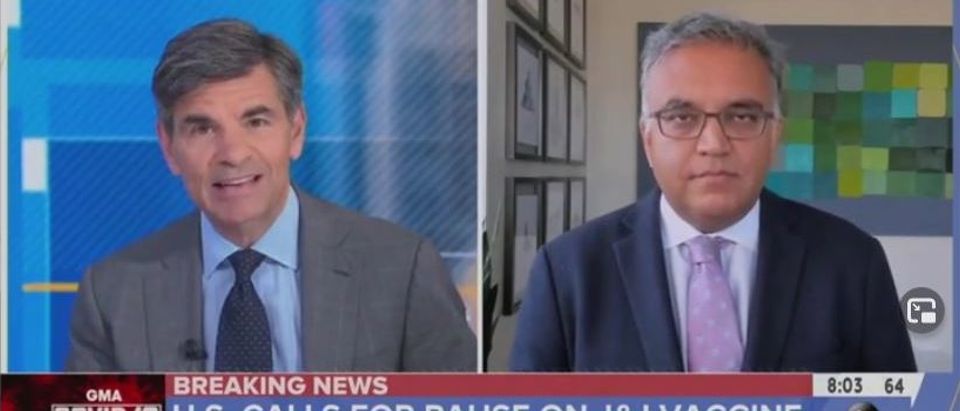Two prominent doctors have emphasized the very few cases of blood clots in Johnson & Johnson COVID-19 vaccine patients after the Center for Disease Control and Prevention (CDC) and Food and Drug Administration (FDA) announced that they would pause its administration.
“I believe the Johnson & Johnson vaccine is exceedingly safe. These are very rare events,” Dr. Ashish Jha of the Brown University School of Public Health told ABC News’ George Stephanopoulos on Tuesday. “I think the Johnson & Johnson vaccine is both terrific in its efficacy and exceedingly safe based on everything I know.”
“I’d feel comfortable having my family get it,” Jha continued, although he did say that he believes the CDC and FDA made the right decision in pausing vaccinations.
Six patients out of the nearly seven million who received the Johnson & Johnson vaccine developed a blood clot called a cerebral venous sinus thrombosis (CVST), public health officials announced Tuesday. All six are women between the ages of 18 and 48, and the clots developed between six and 13 days after receiving the vaccine. One of those patients has since died, FDA and CDC officials announced during a conference call. One remains in critical condition, and the other four have made full recoveries.
Regarding the recommended pause of the J&J vaccine, it’s essential to contextualize the numbers. The CDC and FDA have looked into 6 people who got unusual clots; in the United States people have received more than 6.8 million Johnson & Johnson doses https://t.co/cClXg4IMFC
— Dan Santella (@KELODanS) April 13, 2021
CVSTs affect five people out of every million each year, according to Johns Hopkins Medicine. Therefore, CVSTs appear nearly six times more often in the general population than they do in the group that received the Johnson & Johnson vaccine.
Former FDA Commissioner Dr. Scott Gottlieb said it was important that the FDA did not revoke the drug’s emergency use authorization. “They didn’t order this off the market. This was a requested pause, which is an awkward regulatory step, but I think it reflects the level of caution on their part to not to appear to act too forcefully here,” he told CNBC.
“This is a rare side effect. We’ve seen it now potentially with the AstraZeneca vaccine. And so, there may be a thought inside the FDA that it could be causally related,” Gottlieb said.
“They want to understand what the numerator is, make sure that if it’s in fact six cases in seven million, that’s what it is and it’s not many more cases that they’re missing.”
Multiple countries briefly halted the distribution of the AstraZeneca vaccine following reports of blood clots, although the European Medicines Agency (EMA) emphasized that the vaccine is “safe and effective.” AstraZeneca has yet to seek the FDA’s emergency use authorization for its vaccine, according to Axios. (RELATED: Biden Admin To Send 2.5 Million Doses Of AstraZeneca Vaccine To Mexico, Canada)


